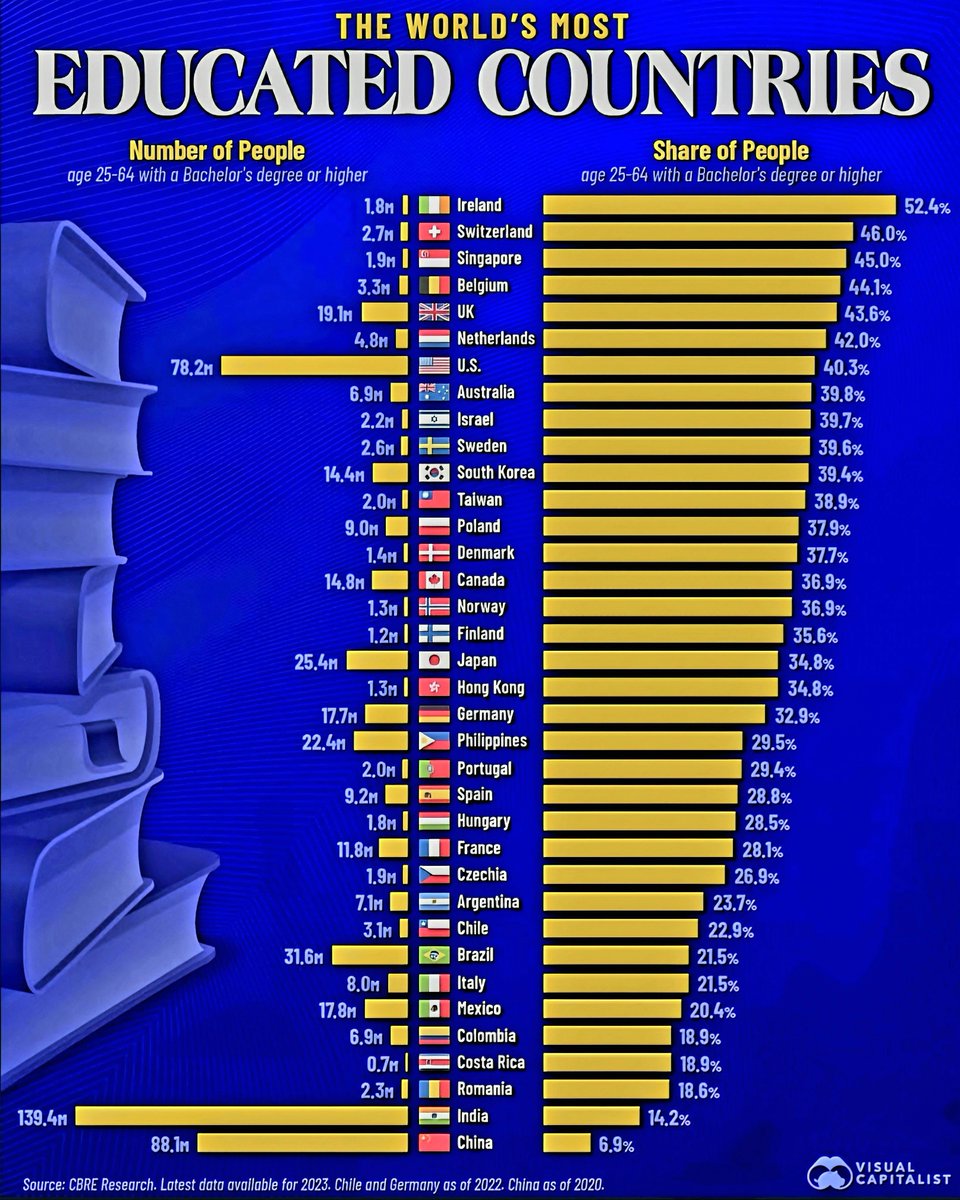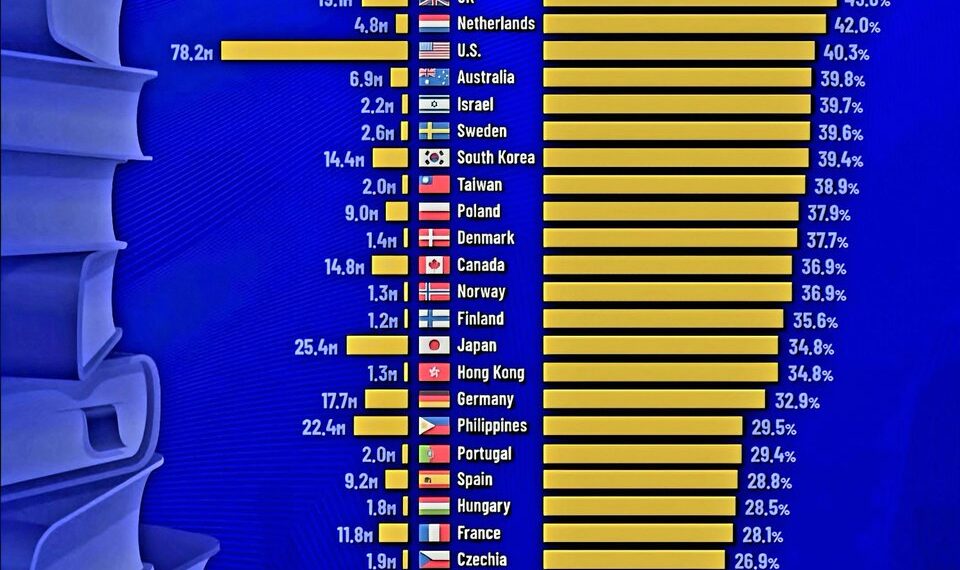Select Language:
The World’s Most Educated Countries: A Closer Look at Global Education Levels
Education is often considered a gateway to opportunity, and the latest data on countries with the highest percentage of adults holding Bachelor’s degrees or higher sheds light on which nations are leading in this crucial area. The statistics, sourced from CBRE Research, offer insights into the educational achievements of populations aged 25 to 64 as of 2023. Here’s a breakdown of the countries taking the lead in education.

Ireland: A Leader in Education
Ireland tops the list with an impressive 52.4% of its adult population holding at least a Bachelor’s degree. This reflects not only the country’s commitment to education but also its thriving economy, which benefits from a highly skilled workforce. The Irish educational system emphasizes both academic and vocational training, preparing students for a variety of career paths.
Switzerland: A Stronghold of Higher Learning
Following closely is Switzerland, where 46% of adults have earned Bachelor’s degrees or higher. Renowned for its quality of education, Switzerland’s universities are frequently ranked among the best in the world. The nation’s multilingual population also contributes to a diverse educational landscape that prepares students for global opportunities.
Singapore: Education at Its Core
Singapore boasts a 45% higher education rate among adults, showcasing its strategic focus on becoming a knowledge-based economy. The government invests significantly in education, ensuring that students receive a robust education that prepares them for the challenges of the 21st century. The emphasis on math and science has made Singapore a global leader in educational performance.
Belgium: Fostering Academic Growth
With 44.1% of its population holding a Bachelor’s degree or higher, Belgium is dedicated to fostering academic growth. Its system allows for multiple languages and diverse cultural influences, enriching the educational experience for students and preparing them for a multicultural world.
United Kingdom: A Traditional Education Hub
The United Kingdom ranks fifth with 43.6% of adults having achieved at least a Bachelor’s degree. Home to some of the world’s most prestigious universities, the UK has a long-standing tradition of academic excellence. The educational system encourages critical thinking and innovation, producing graduates who become leaders across various fields.
Netherlands: Education for All
The Netherlands is known for its high educational standards, with 42% of adults holding Bachelor’s degrees or more. Dutch universities emphasize research and collaboration, producing graduates who are well-equipped to meet the demands of the global workforce. The country’s progressive policies also promote equal access to education for all citizens.
United States: A Global Player
In the United States, approximately 40.3% of adults have earned at least a Bachelor’s degree, which equates to around 78.2 million people. The U.S. is home to a vast network of diverse institutions ranging from community colleges to Ivy League universities, catering to a wide array of educational needs and preferences.
Australia: Bridging Education and Opportunity
Australia stands at 39.8%, with a strong emphasis on higher education. The country is known for its world-class universities and high student satisfaction rates. The Australian education system attracts international students, fostering a global educational community.
Israel: A Model of Innovation
With 39.7% of adults holding a Bachelor’s degree or higher, Israel is notable for its focus on entrepreneurship and innovation in education. The country has invested heavily in its technology sector, driven in part by the highly educated population.
Sweden: A Commitment to Lifelong Learning
Sweden boasts a 39.6% higher education rate among adults, reflecting its commitment to lifelong learning. The government supports educational opportunities at all stages of life, ensuring that citizens have access to quality education that evolves with changing societal needs.
South Korea: The Education Powerhouse
South Korea’s education system produces a staggering 39.4% of its adult population with at least a Bachelor’s degree. The country’s rigorous educational environment is often cited as a model for academic achievement, preparing students for a competitive job market.
Taiwan: A Steady Rise in Higher Education
With 38.9% of adults holding Bachelor’s degrees or higher, Taiwan has made significant strides in educational attainment. The government emphasizes technological education, which aligns with its status as a global manufacturing hub.
Poland: Growing Educational Ambitions
Poland’s educational system has 37.9% of its population achieving a Bachelor’s degree or higher. The country has made notable investments in higher education, aiming to boost its economy and global competitiveness.
Canada: A Focus on Inclusivity
Canada has 36.9% of its adult population holding at least a Bachelor’s degree, reflecting a strong focus on inclusivity in education. The country’s universities are known for their welcoming environments and diverse student bodies.
Norway: A Commitment to Quality
Norwegain educational attainment stands at 36.9%, underscoring the nation’s focus on quality education and research. The government’s investment in education ensures that citizens have the skills needed for tomorrow’s job market.
Finland: A Global Education Paradigm
With a 35.6% higher education rate, Finland is often cited for its innovative approach to education. The Finnish model emphasizes student well-being and creativity, garnering global admiration.
Japan: Tradition Meets Modernity
Japan offers a balance of tradition and modernity, with 34.8% of its population holding a Bachelor’s degree or higher. The country focuses on education as a bedrock for its technologically advanced society.
Closing Thoughts
As we delve into the global education landscape, it’s evident that many countries are prioritizing higher education as a means to foster economic growth, innovation, and equality. These statistics not only highlight the nations leading in educational attainment but also set a benchmark for others striving to improve their educational systems. Investing in education is essential for building a brighter future for individuals and society as a whole. Keep an eye on these leaders, as they continue to shape the workforce of tomorrow.






